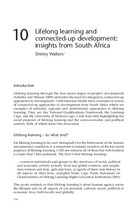| dc.contributor.author | Walters, Shirley | |
| dc.date.accessioned | 2015-12-04T10:33:48Z | |
| dc.date.available | 2015-12-04T10:33:48Z | |
| dc.date.issued | 2011 | |
| dc.identifier.citation | Walters S. (2011) “Lifelong learning and connected-up development: insights from South Africa” in Jin Yang and Raul Valdes-Cotera (Eds) CONCEPTUAL EVOLUTION AND POLICY DEVELOPMENTS IN LIFELONG LEARNING, Hamburg, Unesco Institute for Lifelong Learning pp 114-119 | en_US |
| dc.identifier.uri | http://hdl.handle.net/10566/2006 | |
| dc.description | UNESCO Institute for Lifelong Learning | en_US |
| dc.description.abstract | Lifelong learning through the four major stages of people’s development
(Schuller and Watson 2009) embodies the need for integrated, connected-up
approaches to development. I will reference briefly three examples in action
of connected-up approaches to development from South Africa which are
examples of national, regional and institutional approaches to lifelong
learning. They are: the National Qualifications Framework, the Learning
Cape, and the University of Western Cape. I will start with highlighting the
social purposes of lifelong learning and the socio-economic and political
context, both of which frame the discussion. | en_US |
| dc.language.iso | en | en_US |
| dc.publisher | UNESCO | en_US |
| dc.subject | Lifelong learning | en_US |
| dc.subject | Development | en_US |
| dc.subject | University of the Western Cape | en_US |
| dc.subject | National Qualification Framework | en_US |
| dc.subject | South Africa | en_US |
| dc.title | Lifelong learning and connected-up development: insights from South Africa | en_US |
| dc.type | Book chapter | en_US |
| dc.privacy.showsubmitter | false | |
| dc.status.ispeerreviewed | true | |

